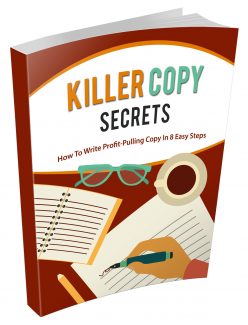 License Type: Master Resell Rights
License Type: Master Resell Rights  File Type: ZIP
File Type: ZIP
 SKU: 59394
SKU: 59394  Shipping: Online Download
Shipping: Online Download
Ebook Sample Content Preview:
Introduction
“A copywriter is a salesperson behind a typewriter.”
A quote comes from Judith Charles, president of her own retail advertising agency, Judith K. Charles Creative Communication. And it’s the best definition of the word copywriter I’ve ever heard. The biggest mistake you can make as a copywriter is to judge advertising as laypeople judge it. If you do, you’ll end up as an artist or an entertainer—but not as a salesperson. And your copy will be wasting your client’s time and money.
When ordinary folks talk about advertising, they talk about the ads or commercials that are the funniest, the most entertaining, or the most unusual or provocative. Geico commercials with the talking lizard, Budweiser’s “real men of genius” radio spots, and the annual creative TV commercial extravaganza broadcast during the Super Bowl are the ads people point to and say, “I really like that!”
But the goal of advertising is not to be liked, to entertain, or to win advertising awards; it is to sell products. The advertiser, if he is smart, doesn’t care whether people like his commercials or are entertained or amused by them. If they are, fine. But commercials are a means to an end, and the end is increased sales—and profits—for the advertiser.
This is a simple and obvious thing, but the majority of copywriters and advertising professionals seem to ignore it. They produce artful ads, stunningly beautiful catalogues, and commercials whose artistic quality rivals the finest feature films. However, just because an ad is pretty and pleasant to read doesn’t necessarily mean it is persuading people to buy the product. Sometimes cheaply produced ads, written simply and directly without a lot of fluff, do the best job of selling.
Chapter 1: Headlines
Headlines are so important that a single word can impact a campaign dramatically. We’ve seen e-mail subject lines where a one word change increased click-throughs by 46%.
Open rates were nearly identical and the e-mail creative was exactly the same for both versions, but click-throughs went up by 46% in the second. If the ad was sent to 2,000,000 e-mails, the winning version would lead to 17,000+ more clicks, all from changing a single word. That’s a measurable difference that significantly impacts the bottom line.
So why are headlines so important? It’s because they’re the first lines of your copy that customers read. They create an initial impression that either draws readers in or pushes them away. Even if the rest of the copy is amazing and would convince 3 out of 10 people to buy, if the headline puts them to sleep, only a fraction of the customers who would have bought something will read your copy and make a purchase. The headline alone can make or break an ad, homepage, or e-mail subject line. It sets the tone for the rest of the copy. If the headline pulls readers in, you’ll make more sales; if not, you’ll be left wondering what happened.
And that’s why we’re devoting an entire chapter to headlines. By following the points in this chapter, you’ll learn how to write attention-grabbing headlines that convert readers into buyers.
How To Write Attention Grabbing Headlines That Convert
If you hang around copywriting circles long enough, you’re sure to read this rule at one point or another because most copywriter’s view getting potential customers to continue reading as the number rule of headline writing. Convincing your customers to keep reading means the time or money you invest in your copy won’t go to waste. So first, focus on writing a headline that pulls your customers in and compels them to read the first sentence.
Your Headline Should Be Unique
The first thing you want to consider is how to make your headline unique. If yours is just like everyone else’s, then your company won’t stand out. Your customers won’t have any reason to think you’re different than your competitors, which means they won’t have any reason to buy from you than from someone else.
Today’s consumers are savvier than customers of the past. They’re used to being bombarded with commercial after commercial that says the same thing. We can all remember watching a commercial with lines like, “Buy now with three low payments of $24.95. That’s right. Only $24.95 per month. If you buy today, you’ll get a free carrot peeler valued at $19.95.”
Businesses use commercials like this because they work, at least on a subset of customers, but many people are turned off by commercial wording they’ve heard over and over again. As soon as they hear, “Three equal payments of $24.95,” they tune out waiting for something that seems more credible.
If you sound the same as everyone else, you’re automatically going to put customers to sleep, but if you do something different, you’ll stand out, your message will be refreshing, and you may delight your customers enough to get them to buy from you.
Your Headline Should Be Ultra Specific
In addition to being unique, your headline should be ultra-specific. It should provide enough information to let customers know whether or not the offer you're presenting is interesting to them. If your headline isn’t specific enough, customers won’t know whether or not what you’re selling is something they’re interested in.
Here’s an example:
A while ago I visited a blog with this headline: “You’ll Be Missed.” I had no idea what it was about. Did the owner lose a family member? Did her dog pass away? Did something else terrible happen? I felt bad for her, but I had no idea what was going on.
When I clicked through, I found out it was a post about Steve Jobs. He had just passed away in the past couple of days, and the author was writing about how she would miss Mr. Jobs. It ended up being a well-written post, but as a reader, I had no idea what it was about until I clicked through to read.
In cases like this, it’s much better to provide enough specific information to compel readers to continue reading than to write something “clever” that doesn’t give readers adequate information to decide whether or not they’re interested.
Your Headline Should Conveys A Sense Of Urgency
When possible, your headline should convey a sense of urgency. It should include something that compels readers to continue reading so they don’t miss out. This isn’t a rule that can always be used, but when it can, it works really well.
Here’s an example:
This post ended up doing well on the KISSmetrics blog. It’s titled “Are You Losing Sales by Giving Customers Too Many Choices?” So why was it so successful?
One of the reasons is that it conveys a sense of urgency. When business owners read it, automatically they think, “Hmmm... maybe I am losing sales. I need to read this article to find out.” And then they click through to read. The urgency of losing sales compels them to read the post.
Whenever possible, it’s good to write headlines that convey a sense of urgency to convince people to continue reading.
Your Headline Should Be Useful
This may be the most important tip of all. If your headline isn’t useful and doesn’t convey a benefit, then it may not give people a reason to continue on past the headline. People want to know what benefit they’ll receive from reading what you’ve written.
This also happens to be one of the rules that companies break the most. They end up writing something clever because for some reason most people think that’s the point of writing a headline. In doing so they fail to communicate a benefit and fail to give readers a reason to continue reading. Eventually, they end up with disappointing sales because no one pays attention to their copy. That’s a mistake you don’t want to make.








